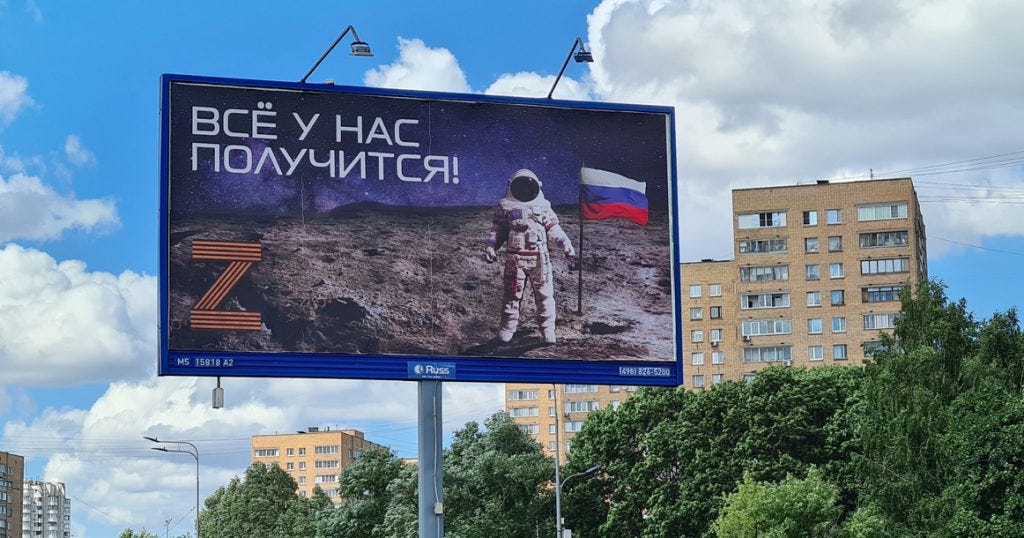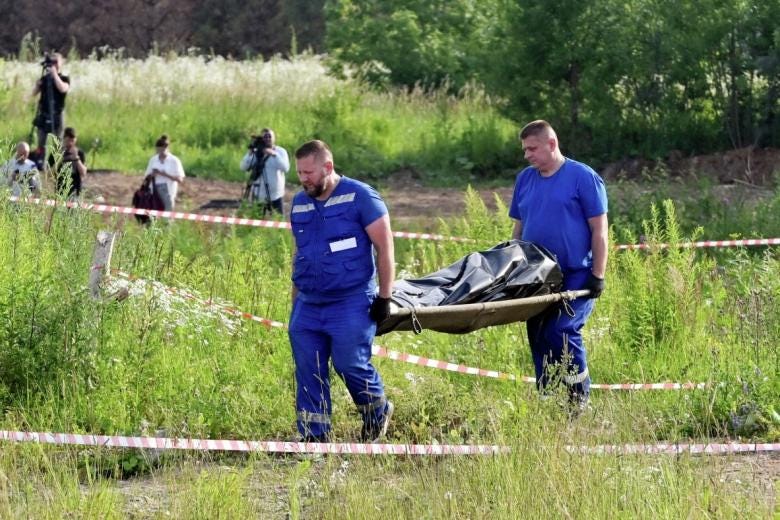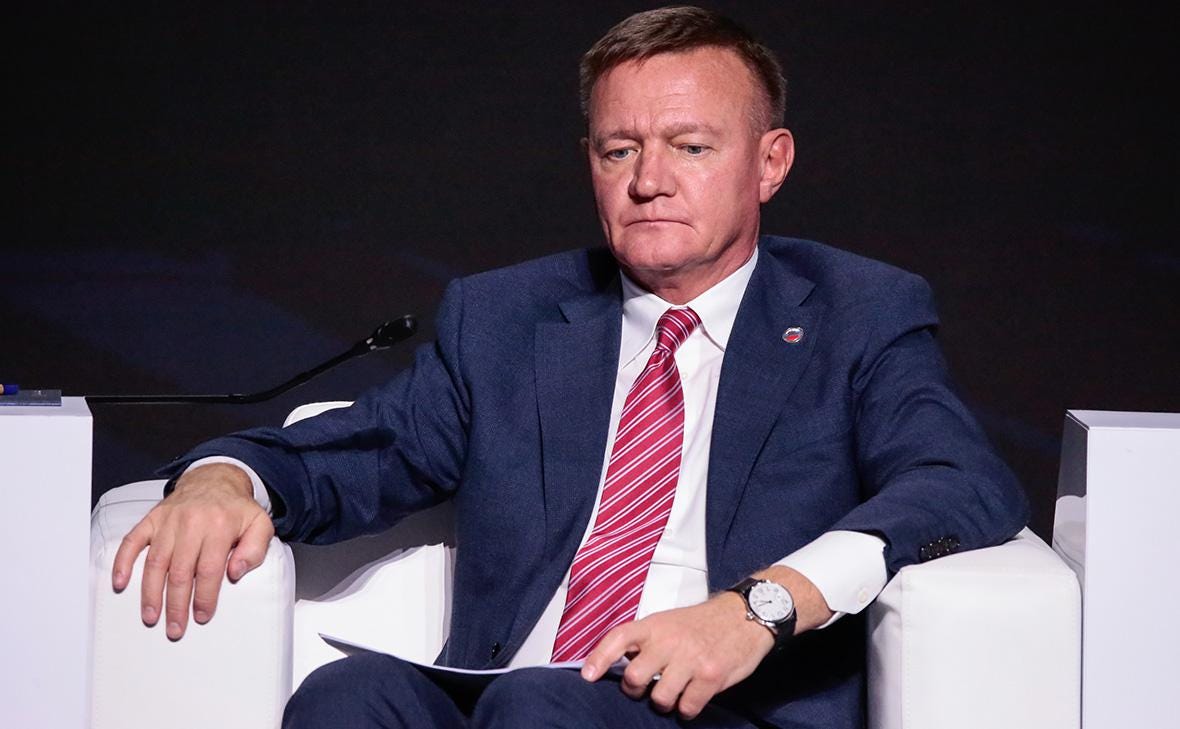“We’ll Succeed” — Pro-War Propaganda in Moscow Depicts a Man with a Russian Flag on the Moon
The biggest shock for the Russian political elite this summer: in Moscow, Minister of Transport and former governor of the Kursk region Roman Starovoit shot himself—he knew that Putin had already made the decision to dismiss him. The minister’s suicide marks the beginning of a new era in Russian politics: now the security services have carte blanche to persecute anyone they deem an obstacle to waging war.
Death and the Tesla
Moscow has seen its share of tragedies: ministers have been arrested and imprisoned, high-ranking officials have accidentally fallen out of windows or died under other suspicious circumstances. But the suicide of Roman Starovoit is absolutely clear: the minister knew that a criminal case was looming and likely arrest. Upon learning that Putin had signed a decree for his dismissal, he took his own life.
The circumstances surrounding the minister’s death resemble the plot of a contemporary Russian crime drama.
Starovoit last spoke to his family on Saturday, July 5. In a depressed state, he attended his daughter’s sporting event, hugged her briefly, and left. After that, he did not respond to family members. According to Forbes Russia, citing a source close to the investigation, Starovoit most likely took his life that same Saturday—knowing his dismissal was imminent. He drove his Tesla to Malevich Park—a conceptual open-air art space near the elite suburban community where he lived.
This place is a vivid symbol of the pre-war era: gentrification, trendy architecture, upscale restaurants, fitness centers, bike paths, tennis courts, art installations—all in a location supposedly once frequented by the legendary early 20th-century artist Kazimir Malevich. The entire setting evokes pre-war, hipster Moscow—and feels oddly out of place in today’s wartime reality.
But the minister didn’t go into the park. He parked his Tesla nearby and shot himself in the bushes by the parking lot, using an award pistol he had received for professional achievements in 2023—already during wartime.
It wasn’t until Sunday, Jult 6th, that Putin officially dismissed the already-deceased minister. Only afterward was Starovoit’s body found. Various state agencies then rushed to scrub any mention of him from their websites. He was even posthumously expelled from the ruling party, United Russia.
No government officials commented on his death, though several ministers did attend his funeral.
Starovoit’s suicide, according to Russian officials, feels like a message from the past. Everyone thought such things only happened in Soviet times. It’s hard to believe something like this could happen today, in the cynical present.
A Model Official from St. Petersburg
This death is a direct consequence of the war. Roman Starovoit was a native of St. Petersburg and worked in the city’s government, particularly on projects involving the construction of automobile plants (Toyota, Nissan, Suzuki). He was later transferred to Moscow, where he worked in the federal government on preparations for the Sochi Olympics. He then headed the Russian state corporation responsible for road construction. Finally, in 2018, he became governor of the Kursk region.
In May 2024, Starovoit was promoted again—he was transferred back to Moscow and appointed Minister of Transport. His career seemed to be on an unstoppable upward trajectory. But in August 2024, Ukrainian forces easily occupied part of the Kursk region—arguably the greatest shock to the Russian authorities since the war began.
That’s when Russian investigators began looking for those responsible: why was the Kursk region so defenseless and unprepared? After the invasion of Ukraine, more than $250 million had been allocated from the federal budget to build a system of fortifications—the so-called "dragon’s teeth."
One of the first to be arrested was Starovoit’s successor as governor of Kursk, and then other former regional leaders followed. According to Russian media, they began actively cooperating with investigators, admitting that the funds allocated for the region’s defense had been misused or embezzled. Starovoit, it is reported, knew about this scheme—perhaps even participated in it.
This is a standard practice in contemporary Russia: subordinates are arrested first, they provide compromising material on their superiors, and then the real game begins. Right now, criminal cases are underway against officials in several regions: Sverdlovsk, Samara, Chelyabinsk, Stavropol, and Bashkortostan.
Despite the ongoing criminal investigation, Starovoit remained in office for almost a year after the Ukrainian army entered the Kursk region. Even the total transportation collapse in Russia this month, caused by widespread airport disruptions due to intensified Ukrainian drone attacks, didn’t shake his position. He wasn’t dismissed because of that, but because of denunciations by his former colleagues.
A New Reality
It is becoming increasingly difficult for the Russian authorities to ignore the fact that the war is ongoing—and to convince the population that nothing is happening, that their lives remain unchanged. The Kremlin anticipates that living standards will begin to decline, social tensions will rise, and the number of attacks on Russian cities will increase. Against this backdrop, public resentment is expected to grow toward the sight of full restaurants in Moscow and the ostentatiously comfortable lifestyles of the city’s elites. That is why the authorities believe that showy punishments of corrupt officials should become a regular feature of Russian politics—because they will resonate positively with large segments of the population.
Virtually every high-ranking Russian official and state corporation employee understands that they are now in a risk zone. As a result, they all do their utmost to avoid taking responsibility for anything. But at the same time, most of them are fully prepared for the possibility that arrest and prison are no longer unthinkable outcomes in their own lives.
Putin and Starovoit
In the ethical framework of the modern Russian bureaucrat, prison no longer signifies the end of a career. Increasingly, mid-level civil servants pass through this ordeal. There is a large number of people who have already served time, been released, and returned to work—sometimes in the same field. They continue to earn significant income and secure government contracts. Their lives have not been destroyed by criminal prosecution. The state apparatus is far more forgiving toward its own disgraced officials than it is, for example, toward political prisoners. For dissenters, prison is synonymous with death; for bureaucrats, it is merely a temporary interruption in their ability to make money.
In this context, Roman Starovoit’s suicide made a strange impression on many government officials. The prevailing reaction has been philosophical. “Roman turned out to be too sensitive, emotional, and empathetic. He took it all too personally. In Russia, you need a thicker skin,” reflected one acquaintance of the former minister. According to several sources in Moscow, the main conclusion drawn from the former minister’s death is this: do not give in to emotion or make rash decisions—but do prepare for harsher times ahead.
Everyone is bracing for a future in which repression becomes more frequent, almost routine, in Russian life. This is the inevitable consequence of Russia’s deepening involvement in the war, of an increasingly militarized society. No one will be able to pretend the war doesn’t exist or that they are not involved. Even active participation offers no guarantee of safety.







